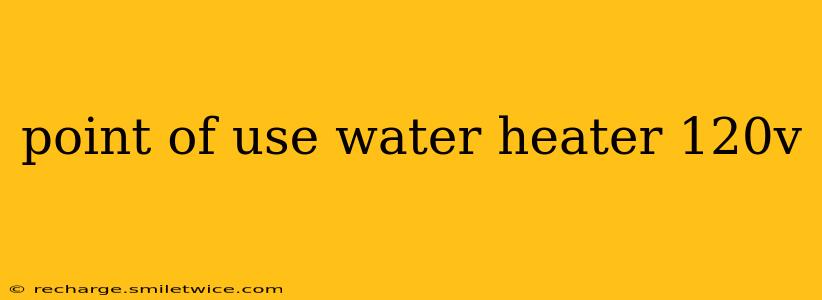Point-of-use (POU) water heaters offer a convenient and energy-efficient solution for providing instant hot water exactly where you need it. Unlike tank water heaters that store large volumes of water, POU heaters heat water only as it's needed, minimizing standby heat loss and saving energy. This article focuses specifically on 120V point-of-use water heaters, exploring their benefits, applications, and considerations.
What is a 120V Point-of-Use Water Heater?
A 120V point-of-use water heater is a compact unit that heats water on demand using standard 120-volt household electricity. This makes it incredibly easy to install and use, requiring only a standard electrical outlet. They're typically smaller than tank water heaters and are designed for specific applications, such as providing hot water to a single sink, shower, or appliance.
Advantages of Using a 120V Point-of-Use Water Heater
- Energy Efficiency: Because they only heat water when needed, 120V POU heaters are significantly more energy-efficient than tank heaters, which constantly lose heat to the environment.
- Space Saving: Their compact size makes them ideal for situations where space is limited, such as apartments, RVs, or smaller homes.
- Convenience: Enjoy instant hot water whenever you need it, without waiting for a tank to heat up.
- Cost-Effective: While the initial cost might be comparable to smaller tank heaters, the long-term savings on energy bills can be substantial.
- Easy Installation: Installation is typically straightforward, requiring only a standard electrical outlet and plumbing connections.
Applications for 120V Point-of-Use Water Heaters
120V POU water heaters are perfect for various applications:
- Kitchen Sinks: Provide instant hot water for washing dishes and other kitchen tasks.
- Bathroom Sinks: Offer hot water for handwashing without the need for a large tank heater.
- Laundry Rooms: Heat water directly for washing machines, reducing the energy used by the washing machine's internal heating element.
- Outdoor Sinks: Ideal for providing hot water for outdoor cleaning tasks, such as washing cars or gardening tools.
- RV and Mobile Homes: Their compact size and low voltage requirements make them ideal for these applications.
How Much Hot Water Can a 120V POU Heater Produce?
The amount of hot water a 120V POU heater can produce varies depending on its wattage and flow rate. Higher wattage units generally heat water more quickly and can provide a higher flow rate. However, even smaller units can usually provide sufficient hot water for most single-point applications. Check the manufacturer's specifications for the exact flow rate and temperature rise of a particular model.
What are the Disadvantages of 120V Point-of-Use Water Heaters?
While 120V POU heaters offer many benefits, there are some limitations to consider:
- Lower Flow Rate: Compared to higher voltage units or tank heaters, they typically have a lower flow rate, meaning the hot water might not last as long during continuous use.
- Limited Hot Water Volume: They're best suited for providing hot water at a single point of use rather than supplying multiple fixtures simultaneously.
- Potential for Scalding: Because they heat water so quickly, it's essential to use appropriate temperature controls to prevent scalding.
Are 120V Point-of-Use Water Heaters Expensive to Operate?
The operating cost of a 120V POU heater depends on its wattage and your electricity rates. While they are generally more energy-efficient than tank heaters, continuous use can still increase your electricity bill. However, the energy savings from not constantly heating a large tank of water usually outweigh the cost of heating water on demand for most applications.
How to Choose the Right 120V Point-of-Use Water Heater
When selecting a 120V POU heater, consider the following factors:
- Wattage: Higher wattage units heat water faster but consume more energy.
- Flow Rate: Choose a unit with a flow rate sufficient for your needs.
- Temperature Control: Look for models with adjustable temperature controls to prevent scalding.
- Installation Requirements: Ensure the unit is compatible with your plumbing and electrical system.
By carefully considering these factors, you can select the best 120V point-of-use water heater to meet your specific hot water needs and enjoy the convenience and energy savings they offer.
